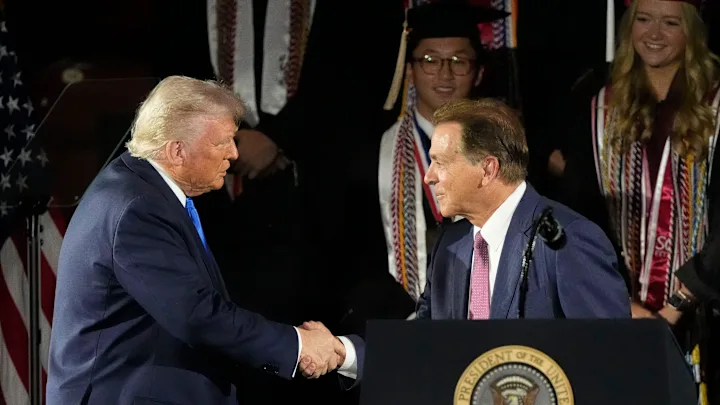In a pivotal moment for collegiate athletics, former President Donald Trump and legendary Alabama football coach Nick Saban convened to discuss the future of college sports, particularly focusing on the evolving landscape of Name, Image, and Likeness (NIL) rights. This high-profile meeting has ignited discussions about potential reforms that could reshape the collegiate sports system.
The backdrop of this meeting is the significant transformation college sports have undergone since the 2021 U.S. Supreme Court decision that ended the NCAA’s restrictions on athletes earning compensation for their NIL. This ruling has led to a surge in NIL deals, with athletes now able to profit from their personal brand. While this change has been hailed as a victory for student-athletes, it has also introduced new challenges, including concerns about competitive balance, recruitment disparities, and the overall integrity of college sports.
Coach Saban, a staunch advocate for college football, has expressed concerns that the current NIL landscape resembles a “pay-for-play” system, where financial powerhouses dominate recruitment, potentially sidelining traditional programs with less financial backing. He has called for a standardized approach to NIL regulations to ensure a level playing field across all institutions.
President Trump’s involvement adds a new dimension to the conversation. Known for his assertive approach to policy and governance, Trump has indicated a willingness to intervene in the collegiate sports arena. Reports suggest that following his meeting with Saban, Trump is considering issuing an executive order to regulate NIL deals, aiming to establish federal guidelines that would standardize NIL compensation and address the disparities that have emerged among schools.
The potential executive order could have far-reaching implications. Proponents argue that federal intervention is necessary to create uniformity and prevent the commercialization of college sports from undermining their educational mission. By implementing standardized regulations, the NCAA and member institutions could operate under a clear framework, reducing the legal uncertainties that have arisen from varying state laws and individual institutional policies.
However, critics caution that such federal intervention could conflict with existing antitrust laws and constitutional protections. The NCAA’s current legal battles, including a $2.8 billion antitrust lawsuit settlement, highlight the complexities of regulating college sports within the confines of federal law. Any executive action that alters the current legal landscape could face significant legal challenges, potentially exacerbating the very issues it seeks to resolve.
Moreover, the timing of this potential intervention is crucial. With ongoing legal proceedings and negotiations regarding athlete compensation and roster limits, any abrupt policy changes could disrupt the delicate balance being sought through the current settlement processes. Legal experts have expressed concerns that premature executive action could derail efforts to reach a fair and equitable resolution for all stakeholders involved.
In the broader context, this development underscores the increasing intersection of politics and college athletics. The involvement of high-profile political figures in the governance of college sports reflects the growing recognition of their cultural and economic significance. As the debate continues, the future of college sports hangs in the balance, with potential reforms that could redefine the landscape for athletes, institutions, and fans alike.
In conclusion, the meeting between President Trump and Coach Saban marks a significant moment in the ongoing evolution of college sports. While the potential for meaningful change exists, careful consideration of legal, ethical, and practical implications is essential to ensure that any reforms serve the best interests of student-athletes and the integrity of collegiate athletics. The coming months will be critical in determining the direction of college sports and the role that federal policy will play in shaping its future.



